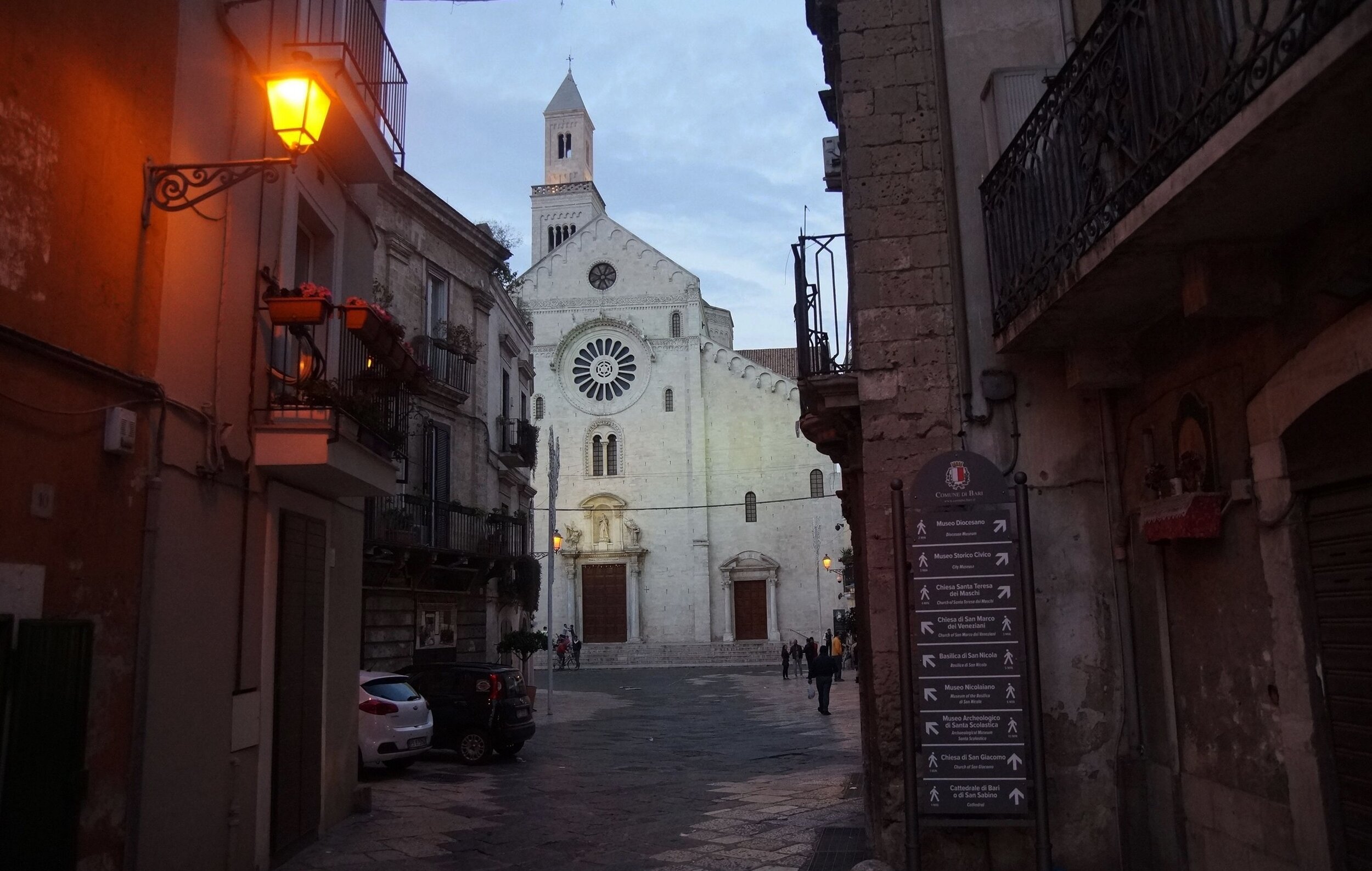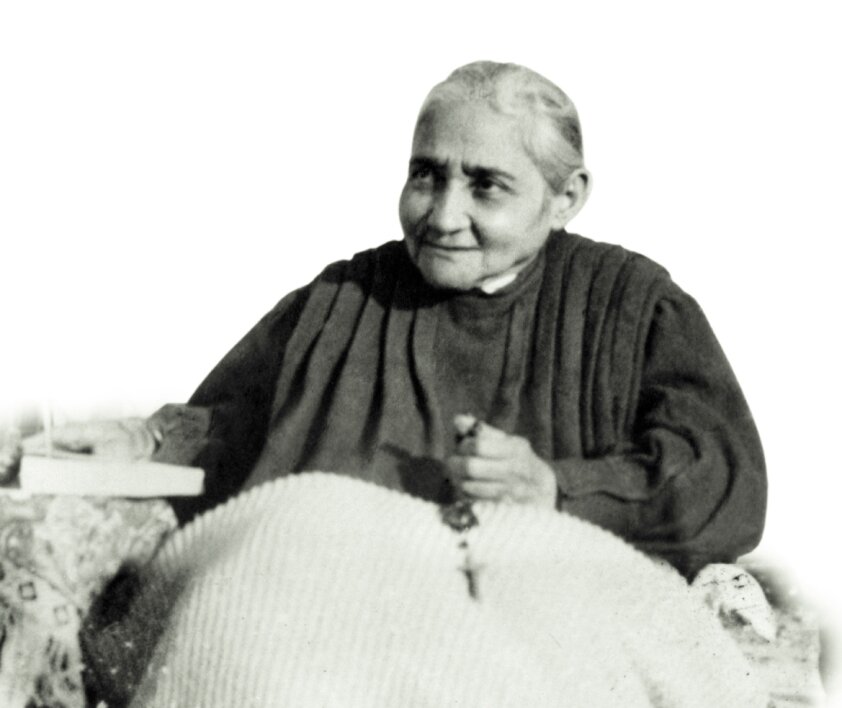In seeing that Luisa wasted away more and more every day, her family decided to bring her to the countryside, to their own farmhouse, to regain her health. The Lord was waiting for her, to make her pass into a new state of life. One day, while she was meditating in the solemn silence of the country of Murge, the evil one made his final assault – so violent as to make her completely lose consciousness. Reduced to a most pitiful state, she had a vision of Jesus suffering for sinners, and conquered by Grace, she fully consented to the Divine Will, accepting the perennial state of victim, to which Jesus and the Most Holy Virgin were calling her.
She was only sixteen; and from this age began those atrocious sufferings which immobilized her for the rest of her life on her bed of suffering. One day, still in the farmhouse, Luisa lost consciousness again, not because of the evil one, but by the Will of Jesus, who made her share in the sufferings of His Passion. As she came round from the ecstasy, Luisa felt great repugnance for any food; so she refused everything, and if sometimes, forced by her parents, she ate something, she would bring it up immediately. Her family attributed this to a new and unheard-of fuss, and therefore she had to suffer new and bitter reproaches. However, this was the Will of God, Who was preparing Luisa to live only from the Divine Will, in such a way that It would be her only food. In fact, this extraordinary phenomenon lasted until her death.
Luisa ate very little, only once a day and out obedience to her confessor; but immediately after, she would sweetly bring up the food, whole, fresh and fragrant. I write these pages and I confirm this phenomenon because I have been a spectator of it. One day, while I was in the house of Luisa, my aunt Rosaria Bucci, her faithful and silent confidant, prepared food for four people: for herself, for me, for Angelina, Luisa’s sister, and for Luisa.
I was surprised upon seeing that the lunch of Luisa consisted of just 4 or 5 orecchiette [pasta with the shape of “little ears”, typical food from Puglia] and a few grapes, which I myself had brought an hour before. Everything was placed on a little plate. After my aunt put grated cheese on it, she told me: “Take it to Luisa”. Surprised by this strange meal, I brought the food to the little room of Luisa. She welcomed me with a smile, placed the plate on the appropriate bed table, made the sign of the cross, and began to eat. Feeling my state of amazement, Luisa smiled at me again, then took a grape and offered it to me. When Luisa finished her lunch (so to speak), she rang a little bell, and soon my aunt appeared, carrying a little tray in her hands. Here began the scene, which I will never be able to forget: Luisa brought up everything in a strange way; I say this, because I felt no repugnance; on the contrary, a strange fragrance diffused throughout the room. Then, removing the little bed table, my aunt closed the shutters and said: “Come Peppino, let’s go eat, for Luisa has to sleep.” My aunt brought to the table the food brought up by Luisa, and there it remained during our lunch. I counted the orecchiette – they were six, and all the grapes, whole and bright – precisely eleven.
This fact so impressed me that, after lunch, I ran home and told everything to my mother, who showed no surprise, since she already knew of it. I remember her saying this sentence: “Blessed Rosaria… how many times have I told her to bring me those leftovers, but she never made me content.” The confessors were opposed to this new prodigy, and ordered her to eat, even if she brought up everything after a little while.
Up to the age of twenty-two, the life of Luisa was tormented by her need to offer herself perennially to the Lord, and by the atrocious humiliations that came from her family and especially from the priests, who, as has already been mentioned, refused to go to her house to call her back to normality, when she was caught by her state of petrifaction.
This entered into the Divine design, which, for Luisa, was a most heavy cross to carry. The need of the priestly authority to give or remove her sufferings constituted the greatest suffering for Luisa. The mother of Luisa, greatly grieved by the continuous mortifications received from priests – who considered these phenomena to be spells, or, at the most, follies of a fanatical girl – turned crying to the Bishop of that time, who, against every expectation, took interest in the case, and gave dispositions so that the priests would go to Luisa’s home every time the circumstance required it. After a mature reflection, the Bishop found it appropriate to delegate a specific confessor, who, bothered with having to go there continuously – almost every day – to wake her up from her particular state, prohibited her from the repetition of this phenomenon. But Our Lord intervened directly to cause the confessor to change his decision, using the cholera epidemic, which, in 1887, claimed many victims in Corato. Luisa asked her confessor to be able to continue her state of victim of reparation and expiation for men. The confessor granted her permission on the condition that she would pray to the Lord to make the scourge of cholera cease.
The cholera disappeared immediately after three days of sufferings by Luisa – who had remained motionless in her bed of suffering. The confessor had to bend to the evidence of the prodigy. The Bishop appointed a shining figure of a priest as Luisa’s ordinary confessor – Don Michele De Benedictis – to whom Luisa opened her soul minutely; this had not been possible for her with other priests. She herself could never explain why.
In order to understand this soul well, Don Michele imposed limits to her sufferings; even more, she could do nothing without his consent, and if necessary, she had to resist even the Lord.
One day Luisa asked the confessor permission to suffer in bed for a certain time, about forty days. “If this is the Will of God, stay”, Don Michele said; but the bed was never again abandoned by Luisa, who was then, in 1888, twenty-three years old, and remained, always sitting, nailed to the bed, for the fifty-nine years until her death, which occurred on March 4, 1947.
It is to be noticed that until then, even though she had accepted the state of victim, Luisa had remained in bed from time to time, because obedience to her confessors had never allowed her to remain bedridden in a continuous way.
After the forty days, Don Michele too, bothered with having to go every day to wake her up, brusquely ordered her not to fall again into that state. Luisa’s reasons, which affirmed that this was the will expressed by God, could do nothing; therefore Luisa had to resist our Lord so as not to fall into her usual state of petrifaction.
But the Lord wanted this soul all to Himself, to lead her along the paths of His celestial graces. So, in order to convince the confessor, the Lord revealed to Luisa the imminent war which was to break out between Italy and Ethiopia.
Don Michele, always firm in his decision, was skeptical in the face of such news, but what was not his stupefaction when, a few days later, he verified its accuracy in the event. We must consider that, in those times, means of communication were not available to everyone, and in a little out-of the-way town of Southern Italy the news did not arrive very easily – and what was thought in Rome was unknown to most. Though reluctantly, Don Michele had to bend to the Will of God; and so Luisa did not abandon her bed, ever again, for all the rest of her life. It was new year’s eve of 1889.











